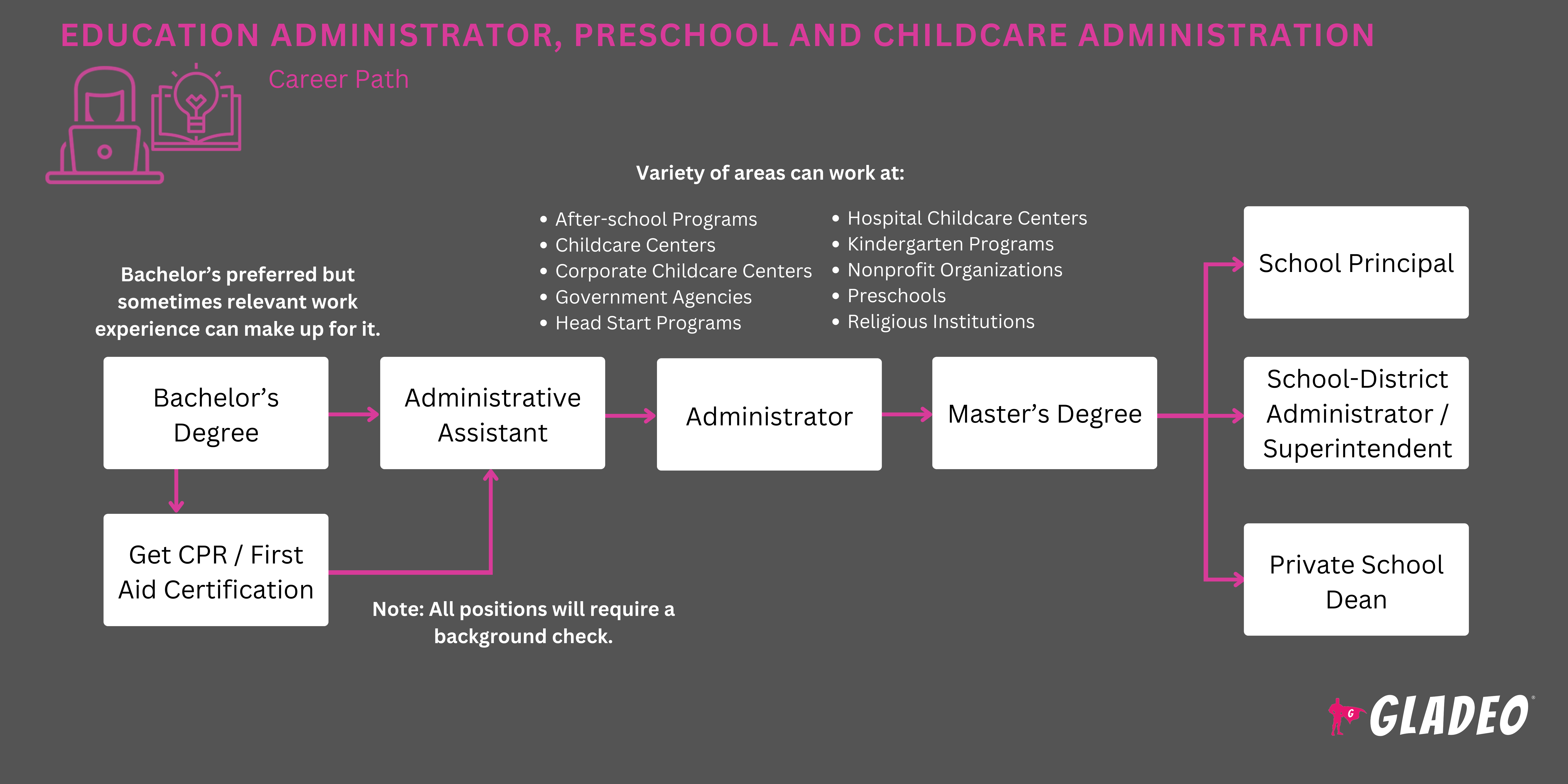Spotlights
Childcare Director, Early Head Start Director, Education Coordinator, Education Director, Education Site Manager, Preschool Director, Preschool Program Director, Principal, Site Coordinator
Schools need more than teachers to operate; they need strong management by skilled administrators who can establish and support institutional goals. Preschool and Childcare Education Administrators must lead and manage staff members and be involved in program design and budgets. They’re fully immersed in all school operations with the end goal of creating and maintaining a safe and proper educational environment for young students.
As arguably the most critical member of the institutional team, Preschool and Childcare Education Administrators keep preschools or daycares running smoothly and efficiently. They are masters of communication, juggling multiple tasks at once while keeping staff, parents, and students all pointing in the same direction. In some cases, they may own and operate their facility, but more often, they report to a higher-up. In all cases, they ensure their institution meets applicable federal, state, and local guidelines.
- Carefully building and overseeing an organized, positive learning environment
- Empowering teachers so they can focus on teaching
- Instituting helpful policies that will benefit staff and students
- Making decisions that can have a direct impact on student futures
"I love working with families in lower socioeconomic areas, connecting them to social and community services and working with them to make sure their children are receiving the best education. Working in early learning, the state preschool programs are the families first experience with public education and having a high-quality program that builds on the foundations of social-emotional, academic and physical education creates life-long eager learners." Pamela Glasell, Program Manager, Early Learning, Cypress School District
Working Schedule
- Preschool and Childcare Administrators work full-time, Monday through Friday, with some roles including evening work or occasional weekends. Overtime may be expected during busy periods, such as enrollments or preparation for a new academic year. When school is out for students, administrators are still working and planning ahead but may enjoy some extra downtime.
Typical Duties
- Lead and supervise faculty and staff to maintain a safe, positive, friendly environment conducive to learning
- Hire new team members and ensure they receive proper training
- Encourage professional development and offer time and incentives to pursue it
- Monitor employee performance and provide feedback
- Create and implement policies and standard operating procedures
- Review training materials and schedules
- Ensure all safety and security measures are feasible and fully understood by workers
- Work closely with staff and parents to ensure students are meeting educational goals
- Build and maintain positive relationships with parents and the community
- Incorporate diversity and inclusion practices
- Oversee all budgetary and facility issues; ensure funding is appropriately distributed and all laws are being adhered to
- Oversee the lifecycle of all student affairs
- Generate and review reports related to student activity
Additional Responsibilities
- Ensure all workers stay current on training, to include refreshers and updates
- Take part in community outreach efforts and social activities
- Work closely with marketing and public relations members, as applicable
- Inspire organizational excellence and seek out best practices to incorporate
Soft Skills
- Ability to focus on short-term and long-range goals
- Basic psychology
- Compassion for young learners
- Complex problem-solving
- Cultural sensitivity and awareness
- Efficient; focused on saving time and resources
- Foreign language proficiency (a bonus)
- Independent
- Leadership ability
- Multitasking despite frequent disruptions
- Objectivity
- Outstanding communication skills, including email etiquette
- Patience
- Persuasiveness
- Perseverance
- Public speaking skills
- Sound judgment and decision-making
- Strong interpersonal and organizational skills
- Team-building
Technical Skills
- Adept at business math, numbers, and figures
- Comfortable using software related to education, accounting, and spreadsheets
- Familiarity with enterprise resource planning programs such as HeadMaster, Childcare Sage, and EZ-CARE2
- Strong computer and office equipment skills
- Knowledge of resource planning software
- CPR and First Aid
- Good with audiovisual presentation equipment
- Private and public schools
- Childcare centers
- Grantmaking and civil organizations
As leaders, Preschool and Childcare Administrators are expected to be at the forefront of changes in the world of education. From keeping up with current policies and standards to finding creative, effective ways to incorporate technology into classroom settings, administrators are required to stay on top of things and be flexible enough to adapt as needed. When problems arise, workers and parents look to the top for solutions.
The 2020 coronavirus pandemic tested programs with challenges they’ve never faced before. Going forward, administrators must apply the lessons learned. It’s up to them to be ready with practical, creative distance learning and hybrid options suitable for the learning needs of their young students. Meanwhile, school and childcare safety protocols have been thrust into the limelight, and it is incumbent upon administrators to learn and implement best practices that protect workers and students from unnecessary risk of exposure to hazards.
Other trends include an increased focus on systematic phonics in literacy instruction, the use of natural environments in learning, the analysis of achievement gap metrics to address causes of academic disparity, and of course the increasing use of technology tools for educational purposes.
Educators are interested in helping others to learn and grow. They may have always had such passion, perhaps from being an older sibling or due to other early childhood experiences. Administrators, in particular, are great at team-building and managing others so that they may have held positions of responsibility in school or at home.
As highly-organized individuals, they probably enjoyed reading nonfiction works that helped them to understand how things work, so they can interact with them more efficiently. As managers, they might have honed their skills through event planning, volunteering, or participating in team projects. It’s likely they enjoyed courses such as public speaking and debate, as well.
"My job is the administer the early learning grants and direct the staff of the early education programs for the Cypress School District. I work in the mornings greeting children and families, making sure the classrooms are ready for staff. I work to ensure the curriculum and district's vision for the program are carried out by the staff. I coach and train the teachers and instructional support staff on the preschool learning foundations and work to strengthen the achievement gap we see in some populations. I assist teachers as needed in the classroom, working with students, helping with behavior challenges and speaking to parents. I take parents on tours of the centers and conduct parent education workshops on various topics. I prepare and submit reports to state and federal agencies and do a lot of recordkeeping." Pamela Glasell, Program Manager, Early Learning, Cypress School District
- A bachelor’s degree is typically needed, preferably in early childhood education or at least with some postsecondary classes completed
- In addition to a degree, administrators usually need a few years of related work experience demonstrating increasing levels of responsibility
- Some states require licensure, which entails passing a thorough background screening and supplemental training such as CPR and First Aid
- A Child Development Associate (CDA) Credential, obtained via the Council for Professional Recognition, is a recognized but generally optional Early Childhood Education credential “based on a core set of competency standards, which guide early care professionals as they work toward becoming qualified teachers of young children.” This cert has to be renewed every 3 years
- Accreditation is crucial to ensure the program meets high quality standards
- Review both school and program rankings on sites like U.S. News to see how they fair against peers
- Look carefully at the costs of in- and out-of-state tuition and other fees, to see how much out-of-pocket expenses you might have to cover after federal aid and scholarships (if applicable)
- Review the program’s commitment to diversity, and see how well they demonstrate that via their enrollee statistics (which should be featured on their website)
- Consider the faculty you’ll study from, to include their awards and areas of research
- Peek at how big average class sizes are, to determine if you’ll get sufficient student-teacher time or not
- Weigh the pros and cons of taking online or hybrid courses versus traditional on-campus attendance. Many schools only offer on-campus programs
- Check out the school’s student organizations, career center, alumni network, and other offerings that can augment your experience while attending, as well provide benefits after graduation!
- Research stats related to the college’s and/or program’s acceptance and graduation rates, and also job placement data (how quickly grads are placed in good jobs)
- Take high school classes to prepare for your bachelor’s coursework, such as psychology, writing classes, business finances, public speaking, etc.
- Ask your school about volunteer opportunities related to your future career. Learning about "behind-the-scenes" processes will help you tremendously!
- Work hard on your “people skills” because you’ll use them every day, managing workers and meeting with parents and stakeholders
- Find volunteer or paid opportunities working with preschool-age children
- Work on your professional network and join organizations such as:
- Association for Childhood Education International (ACEI)
- Child Care Aware of America
- Council for Exceptional Children (CEC), Division for Early Childhood (DEC)
- HighScope Educational Research Foundation
- Military Child Education Coalition (MCEC)
- National Association for the Education of Young Children (NAEYC)
- National Association for Family Child Care (NAFCC)
- National Black Child Development Institute (NBCDI)
- National Head Start Association (NHSA)
- World Organization for Early Childhood Education-United States National Committee
- ZERO TO THREE
- Read professional journals and websites related to the field (see our Websites section for ideas!)
- Consider doing an apprenticeship to gain valuable work experience

- If possible, decide whether you want to aim for a public preschool, a private one, a franchise, or a childcare center
- Keep track of all your scholastic, employment, and extracurricular achievements, and use these on your resume, supported by details, statistics, dollar amounts, and impact
- Sign up for job alerts on Indeed.com, Glassdoor, and related employment portals
- Build out your LinkedIn profile and leverage your network to find job openings
- According to CNBC, up to 80% of jobs are found through personal connections
- Make sure you apply to jobs you’re qualified for; otherwise you’re wasting time
- As you review job advertisements, take note of relevant keywords; work these into your application materials so you don’t get filtered out by Applicant Tracking System software
- Address all listed requirements within the job ad so that the people reading your resume get a full picture of your qualifications
- Consider hiring a professional editor or resume writer to assist!
- Stay up-to-date on trends and developments within the field
- Conduct mock interviews using sample interview questions and answers
- Speak with potential reference providers upfront to ask permission to list them or to obtain recommendation letters
- Preschool and Childcare Administrators are already at the top, but there is always room to move beyond these roles
- Completing a graduate degree is helpful to demonstrate advanced skills attainment and to show that you’re ready to step up to the next level
- Administrators operate facilities entrusted by parents to take care of young children, so it is critical to always display professionalism and outstanding communication
- Impeccable business skills are also key to climbing the ladder as an administrator
- To really stand out, create policies, standard operating procedures, and training guidance that others want to benchmark off of
- Stay active in professional organizations, attend conferences, give keynote speeches, and make yourself a well-known and respected member of your field
- Don’t just stay up-to-date on developments but find ways to lead them yourself!
- Practice your organizational skills by finding reducing inefficiencies
- Turn your facility into a model that inspires others
- Mentor your staff and help others grow. Cultivate a reputation as someone who sincerely cares about the success of peers as well as students, of course!
- Maintain the utmost integrity and earn the respect of your colleagues
Websites
- ACF Office of Child Care
- Child Care Aware
- Council for Professional Recognition
- National Association for the Education of Young Children
- National Child Care Information Center (NCCIC)
- National Early Childhood Program Accreditation
- Office of Head Start
- Pre-K Now
- Reggio Emilia
Books
- Child Care Business Success: Create your positive, productive and profitable child care business!, by Julie Bartkus
- Child Care Millionaire: Secrets to Building a Profitable 7 or 8 Figure Child Care Business, by Brian Duprey
- Handbook for Early Childhood Administrators: Directing with a Mission, by Hilde Reno, et. al.
- Making Preschool Inclusion Work (Strategies for Supporting Children, Teachers, and Programs), by Anne Marie Richardson-Gibbs
- What If We Taught the Way Children Learn?: More Straight Talk About Bettering Education and Children′s Lives, by Rae Pica
Not everyone wants to be an administrator! Many people who are interested in pursuing a career in education want to be on the frontlines, standing in those classrooms! The Bureau of Labor Statistics lists many related occupations which require specific state and subject matter certification or licensure, in some cases. Take the time to consider options that interest you, so you’ll start on the right path! A few choices to think about include:
- Childcare Workers
- Kindergarten and Elementary School Teachers
- Middle School Teachers
- Preschool Teachers
- Special Education Teachers
- Teacher Assistants
Newsfeed

Programs at Foothill
Featured Jobs

Online Courses and Tools












